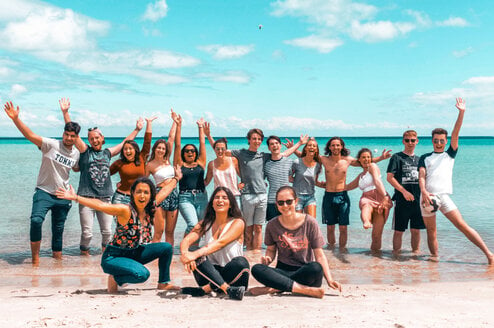Gap Year After High School Programs
Post-High School Gap Year Programs
Pagination
About
Four years. That's typically how long you have spent in high school. Years in which you have had a seemingly endless parade of homework, tests, essays, the SAT and ACT, and the grueling process of researching and applying to colleges. Add those years onto the nine you spent beforehand in K-8th, and it’s totally understandable that, come graduation day, you may be ready for a break before entering college and the world of lectures, essays, and stressful exams.
If this sounds like you, you may want to consider a gap year. Good news: Go Overseas has answers, so if taking a gap year sounds at all appealing, then keep reading our guide to post-high school gap years.
Where to Go
Where should you go?
The world is a big place, and if you want to take a gap year, clear your schedule and pull that dusty old globe off the bookshelf (or rather, hop on Google for a bit more of a modern approach) because you have a huge decision to make.
You can spend your gap year in one place or spend your time getting to know as many new cities as possible. No matter what your plans are, there is one priority that needs to come first, safety.
Whether you want to travel independently or participate in a guided program, you won’t be bringing your mom, dad, or a personal caretaker with you (most likely). During your gap year, you will be living your life with a certain degree of independence, and it is important to ensure you are in an environment that is safe and comfortable for you personally.
Some popular options to spend a gap year after high school include:
- Europe - Ireland, Spain, Czech Republic, Italy, Greece, Germany, Scotland, England, and France are just a few of the many wonderful countries that Europe has to offer.
- Australia or New Zealand are both beautiful, safe, and extremely popular destinations for gap years. Plus, there's a low cultural and language barrier and you could spend your time working if you're worried about funds.
- South America - Argentina, Peru, Chile, and Brazil are all great option -- especially if you're interested in learning Spanish or Portuguese.
- Central America - Costa Rica is safe, affordable and has beautiful rainforests and beaches to explore.
- Asia - Japan, South Korea, Vietnam, Cambodia, and Thailand are all safe and fun destinations for teen gappers -- just be responsible, South East Asia has a reputation for gathering party-loving backpackers (and this doesn't always go over well with the locals). Okay. Stopping the mom talk.
Need more ideas? We've mapped out some pretty cool gap year travel itinerary ideas if you're interested...
Planning Your Trip
Getting Your Parents on Board for a Gap Year Program
While taking a gap year is a great choice, delaying college for any reason is not going to be viewed as very “traditional” or ideal. Chances are you will be met with some skepticism from family and friends -- parents in particular who want the best for your future. Here are a few points to help you get them on board:
On an educational and career level, taking a gap year program can help you deepen your practical, professional, and personal awareness. It can be an opportunity to develop new skills, gain experience related to your intended major, or even spark new interests and lead to an unexpected career path. Plus, it’s guaranteed to look great on your resume!
Many gappers site feeling burnt out as a reason to take a year off before or during college. Most return to university the year after feeling refreshed, focused and are more likely to succeed in their academics.
A gap year is also an opportunity to gain independence and broaden your worldview. For most people, college is the first time they get to experience life on their own. Starting college after a gap year means being expected to demonstrate responsibility and maturity in completely new ways.
Need more material to convince them? Read our article on the benefits of taking a gap year or what colleges actually think about gap years.
What Can you do on Your Gap Year After High School?
What gap year itinerary ideas are worth delaying college for? This brings to mind one of my favorite quotes (attributed to St. Augustine of Hippo). “The world is a book, and those who do not travel read only one page.”
I love this quote as it is an excellent reminder that there are endless possibilities in life waiting to be experienced, many of which would make a potentially awesome gap year! A few ideas for teen gappers:
- Volunteer abroad - sign up for a service learning trip or spend time volunteering in an area that interests you. There are many wonderful volunteer abroad programs just waiting to be explored during your gap year, some of which (service learning in particular) are specifically designed for high school and college aged volunteers.
- Learn a language - fulfill your long time goal of learning a foreign language by going abroad and immersing yourself in a new culture.
- Get an internship - spend time preparing for your future career or deciding what major you want to focus on in college by exploring a professional industry you're interested in.
- Travel - learn independence by planning and taking a gap year to travel abroad.
- Adventure travel - this probably won't be the main focus of your gap year, but why not add a little adventure into your... adventure?
- Take a working holiday - Australia and New Zealand are the most popular destinations for taking a working holiday abroad, but so long as you're over 18, you could spend your gap year working as a ranch hand, barista, server, or hostel front desk helper -- meaning, make money while you gap.
There are many gap year opportunities available out there, so don't limit your daydreams!
How Long of a Gap Year Should You Take?
That is totally up to you. As cliché as it may sound, everybody is different, which definitely holds true for gap years. It's important to look at what is best for you and your situation and not decide based on what other people think. There are many factors to keep in mind when deciding on the length of your gap year. These include:
- College - every university will have their own policy when it comes to deferring your enrollment for a gap year. Some may only allow you to defer till the spring semester, while others may allow, or even prefer, you to take the entire year off. Find out in advance so you can plan accordingly.
- Individual programs - are you participating in a volunteer or internship program abroad? Some gap year programs may strictly be for a certain period of time so looking at your individual plans after high school is an important consideration when deciding on length.
- Personal commitments - what about your friends and family? Do you have any prior commitments in your personal life that may require you to cut your plans short of a year? These should be taken into account when planning your gap year.
- Funds - how much money do you have saved for a gap year? Will you be able to work while abroad? Create a budget and be realistic about how long you can stretch it for.
Costs & College
What About Money?
When planning your gap year, the same question is bound to pop up in your mind as does in everyone’s when making plans. Can I afford it? Don’t you wish that money grew on trees? I know I do! However, the sad reality is, it doesn’t, so it is important to be realistic when planning your gap year.
If you're wondering how much money you will need, the simple answer is, it depends on your plans. A semester-long volunteer trip to South America for instance is bound to cost less than a year in Italy. It's easy to get carried away when planning your gap year, but you want to make sure your plans are not bigger than your budget.
All in all, though, it's very likely it'll be cheaper than a year in college...
What About College?
Now may be the perfect opportunity to discuss the biggest point of all, college. Your acceptance letter may already be in the mail, but that does not have to stop you from taking a gap year. Believe it or not, many universities will not just allow you to defer your start date by a year, but will actually encourage it.
Yes, you read that right, many top universities are actually in favor of accepted students taking a year off to explore other opportunities and interests. Princeton, Harvard, University of North Carolina, and Tufts are just a few examples of such great universities.
Unfortunately, deciding to take a gap year will not get you out of the painful college application process. As the saying goes “all good things must come to an end” and your gap year will be no exception. Apply to college and once you’ve been accepted and chosen your school, look into your particular university’s policy and process on deferring your first semester.
Contributed by Rachel Westmore
What People Are Saying
Related Gap Year Articles
Frequently Asked Questions
-
Do you apply to college before or after gap year?
Although you can apply during either time, it's best to apply to college before your gap year. Once you have the hard application process out of the way and a guaranteed spot at a university, you can defer enrollment and enjoy your gap year experience to the fullest.
Related Content -
Is it harder to get into college after a gap year?
It's best to apply to college with the rest of your peers during high school. Once you've been accepted and chosen the school you want to attend, you can defer your start date for the first semester or the whole year. This way you won't miss a beat between the end of high school, your gap year, and your college education.
Related Content -
Can you take a gap year after high school?
Absolutely! With many high-schoolers feeling burnt out after high school, it's a great time to take a year to learn new skills, volunteer, or learn professional skills that will help you in college and in your future career.
Related Content -
What do you do in a gap year after high school?
There are a lot of options for things to do during your gap year after high school. Although this is not an exhaustive list, some of the things that teens decide to do include volunteering overseas, learning a new language, traveling to a new country, or getting an internship abroad.















